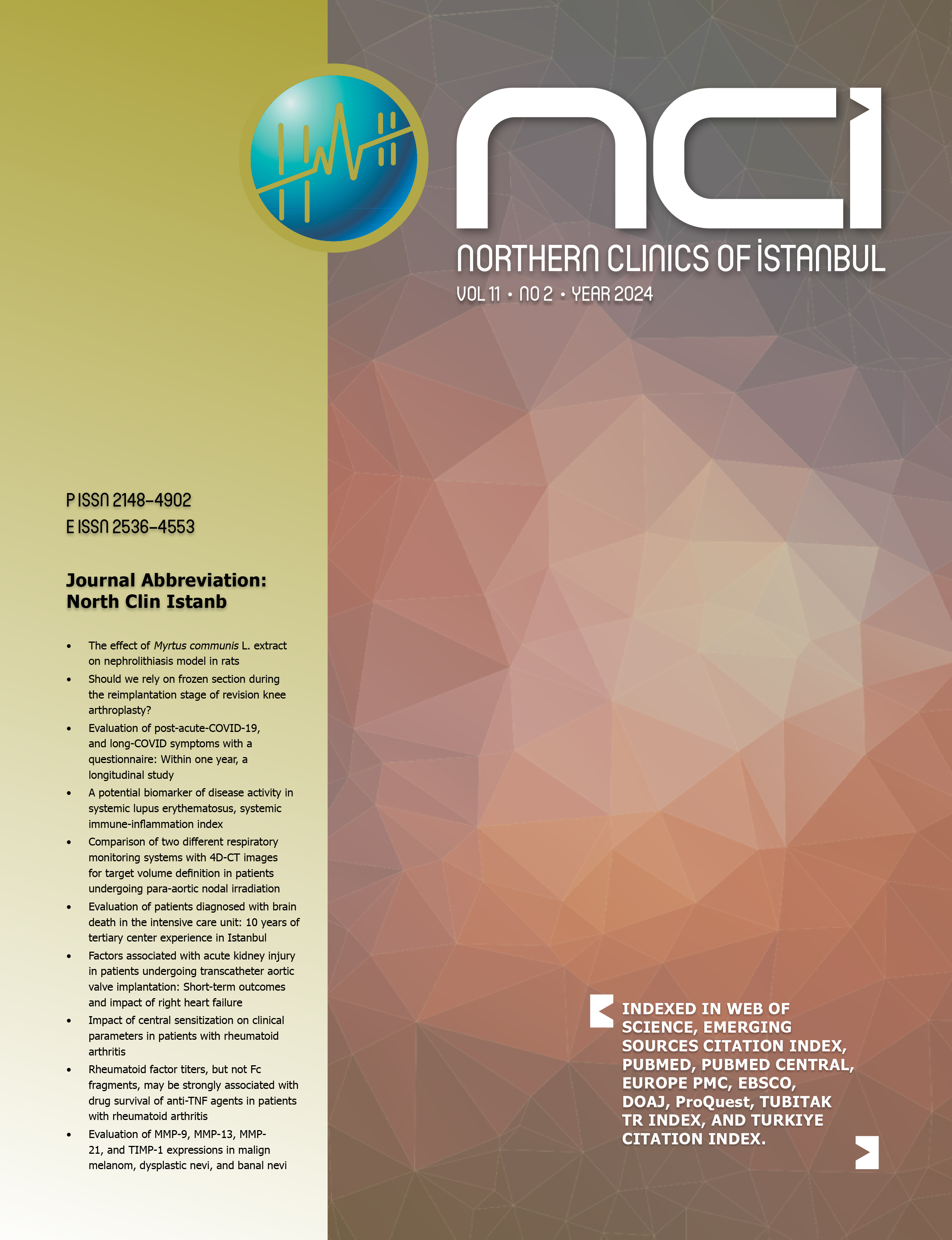Factor 5 and Factor 2 heterozygous positivity and complications in living donor liver transplant donors
Ender Anilir1, Alihan Oral2, Tolga Sahin3, Fatih Turker4, Yildiray Yuzer1, Yaman Tokat51Liver Transplantation Center, Demiroğlu Bilim University Group, Florence Nightingale Hospitals, Istanbul, Turkiye2Department of Internal Medicine, Demiroğlu Bilim University Group, Florence Nightingale Hospitals, Istanbul, Turkiye
3Department of Hepatology and Liver Transplantation Center, Demiroğlu Bilim University Group, Florence Nightingale Hospitals, Istanbul, Turkiye
4Department of Internal Medicine, Haseki Training and Research Hospital, Istanbul, Turkiye
5Department of Hepatobiliary and Liver Surgery, Acıbadem Fulya Hospital, Istanbul, Turkiye
OBJECTIVE: Factor 2 and Factor 5 mutations are among the most common procoagulant genetic disorders and are routinely evaluated in donor preparation. Homozygous mutations are contraindicated for surgery, but heterozygous mutations cannot be said to be an impediment. We aimed to investigate the effect of heterozygous gene mutation of F2 and/or F5 on complications.
METHODS: In our study, 210 living liver donors were examined. The available data of Factor 2 and 5 heterozygous positive donors were evaluated in terms of 21 donor patients and 30 liver recipients. The heterozygous positive group and the control group were statistically compared in terms of age, gender, length of hospital stay, post-operative deep vein thrombosis, pulmonary embolism, portal vein thrombosis, bile duct stenosis and bile leakage complications, lung infection and atelectasis, and wound infection. In addition, these patients were statistically compared in terms of laboratory tests. In addition, complications in recipients implanted with mutant grafts were evaluated statistically and numerically.
RESULTS: Hospital staying was longer statistically in the donor group with heterozygous mutations than in the control group. Hemoglobin and albumin blood levels were lower (p=0.031, p=0.016); INR and ALT levels were higher (p=0.005, p=0.047) statistically in the control group than in the donor group with heterozygous mutations. There was no statistically significant difference between heterozygous mutant groups in terms of biliary tract complications and hepatic vessel thrombosis in recipients.
CONCLUSION: Considering the longer hospital stay in the presence of these mutations, the increased need for treatment
in this process and the close follow-up of liver functions should be considered.
Keywords: Factor 2, Factor 5, heterozygous, liver; mutation; transplant.
Canlı karaciğer nakli donörlerinde Faktör 5 ve Faktör 2 heterozigot pozitifliği ve komplikasyonlar
Ender Anilir1, Alihan Oral2, Tolga Sahin3, Fatih Turker4, Yildiray Yuzer1, Yaman Tokat51Demiroğlu Bilim Üniversitesi Grubu, Florence Nightingale Hastaneleri, Karaciğer Nakli Merkezi, İstanbul2Demiroğlu Bilim Üniversitesi Grubu, Florence Nightingale Hastaneleri, İç Hastalıkları Kliniği, İstanbul
3Demiroğlu Bilim Üniversitesi Grubu, Florence Nightingale Hastaneleri, Hepatoloji Kliniği ve Karaciğer Nakli Merkezi, İstanbul
4Haseki Eğitim ve Araştırma Hastanesi, İç Hastalıkları Kliniği, İstanbul
5Acıbadem Fulya Hastanesi, Hepatobiliyer ve Karaciğer Cerrahisi Kliniği, İstanbul
Amaç: Faktör 2 ve faktör 5 mutasyonları, en yaygın prokoagülan genetik bozukluklardandır ve donör hazırlığında rutin olarak değerlendirilmektedir. Homozigot mutasyonlar ameliyat için kontrendikedir, ancak heterozigot mutasyonların engel olduğunu söylenemez. Faktör 2 ve/veya Faktör 5 heterozigot gen mutasyonunun komplikasyonlar üzerine etkisini araştırmayı amaçladık.
Yöntemler: Çalışmamızda 210 canlı karaciğer donörü incelendi. Faktör 2 ve 5 heterozigot pozitifliği bulunan donörlerden, data bilgilerine ulaşabildiğimiz 21 hasta donör incelemesi, 30 hastaya ait greft karaciğer alıcı sonuçları açısından değerlendirildi. Heterozigot pozitif grup ile kontrol grubu yaş, cinsiyet, hastanede kalış süresi, postoperatif Derin ven trombozu (DVT), pulmoner emboli, portal ven trombozu (PVT), safra kanalı stenozu ve safra kaçağı komplikasyonları, akciğer enfeksiyonu, atelektazi ve yara enfeksiyonu açısından istatistiksel olarak karşılaştırıldı. Ayrıca bu hastalar laboratuvar testleri açısından istatistiksel olarak karşılaştırıldı. Ek olarak, mutant greft implante edilen alıcılardaki komplikasyonlar istatistiksel ve sayısal olarak değerlendirildi.
Bulgular: Hastanede kalış süresi istatistiksel olarak heterozigot mutasyonlu donör grubunda kontrol grubuna göre daha uzundu. Postoperatif ortalama Hemoglobin (hb) ve albümin kan düzeyleri mutant donörlerde daha düşüktü (p=0.031, p=0.016). Kontrol grubunda INR ve ALT düzeyleri heterozigot mutasyonlu donör grubuna göre istatistiksel olarak daha yüksekti (p=0.005, p=0.047). Alıcılarda safra yolu komplikasyonları ve hepatik damar trombozları açısından heterozigot mutant gruplar arasında istatistiksel olarak anlamlı bir fark yoktu.
Sonuç: Bu mutasyonların varlığında hastanede kalış sürelerinin daha uzun olduğu düşünüldüğünde bu süreçte tedavi ihtiyacının artacağı bilinmeli, karaciğer fonksiyonları yakın takip edilmelidir. (NCI-2023-6-17)
Anahtar Kelimeler: Faktör 2, Faktör 5, heterozigot, karaciğer; mutasyon; nakil.
Manuscript Language: English





















